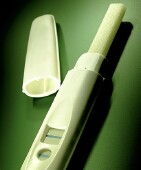
WEDNESDAY, March 13 (HealthDay News) — Fertility rates are about the same for women who undergo different types of treatments for ectopic pregnancy, according to a new study.
In an ectopic pregnancy, the fertilized egg grows outside the uterus, usually in the fallopian tubes. This typically leads to a miscarriage.
This study looked at pregnancies among more than 400 women in France two years after their ectopic pregnancy had been treated using one of three methods: methotrexate injection to halt the pregnancy; conservative surgery, which preserves the fallopian tube; and radical surgery, which removes the fallopian tube.
The first part of the study compared drug treatment and conservative surgery, while the second part compared conservative and radical surgery. The researchers did not directly compare drug treatment and radical surgery, because some women must be treated by surgery.
Pregnancy rates two years after treatment were 67 percent among women who received methotrexate, about 70 percent among those who had conservative surgery and 64 percent among those who had radical surgery.
The study was published online March 13 in the journal Human Reproduction.
“This is the first randomized study to be able to compare fertility after the three treatments for ectopic pregnancies,” Dr. Perrine Capmas, a gynecology surgeon and obstetrician at the University Paris Sud, said in a journal news release. “We found that two years after treatment, there was no significant difference in fertility among the women who received medical treatment or conservative surgery in the first arm of the study, or women who received conservative or radical surgery in the second arm.”
Experts welcomed the findings.
“This is good news, as it reaffirms our experience that [nonsurgical] medical treatment is sufficient in most cases of ectopic pregnancy that are picked out early enough,” said Dr. Avner Hershlag, chief of the Center for Human Reproduction at North Shore University Hospital, in Manhasset, N.Y.
And Dr. Jennifer Kulp Makarov, a fertility specialist at Maimonides Medical Center in New York City, said the statistics on fertility were strong, no matter what treatment was used.
“This … is good news for women who have had an ectopic pregnancy. It gives confidence that women treated for ectopic pregnancy, whether with surgery or with medication, have high rates of fertility after treatment,” Makarov said. “The majority of women who desired to become pregnant after treatment for an ectopic pregnancy were able to do so, and most of these pregnancies were located in the uterus.”
More information
The Nemours Foundation has more about ectopic pregnancy.

